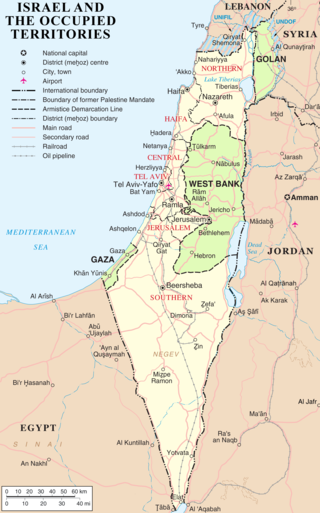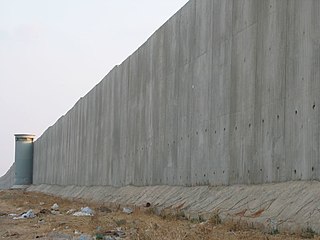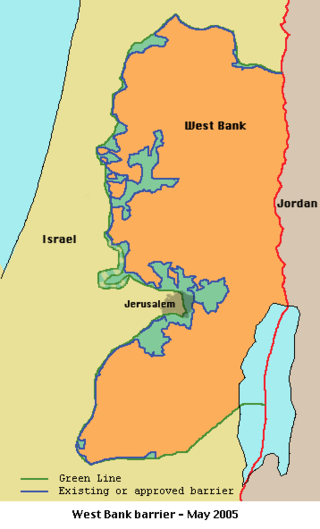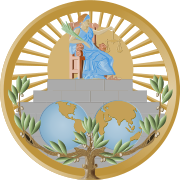
Israeli settlements or colonies are civilian communities where Israeli citizens live, almost exclusively of Jewish identity or ethnicity, built on lands occupied by Israel since the Six-Day War in 1967. The international community considers Israeli settlements to be illegal under international law, though Israel disputes this.

The Palestinian territories are the two regions of the former British Mandate for Palestine that have been occupied by Israel since the Six-Day War of 1967, namely the West Bank and the Gaza Strip. The International Court of Justice (ICJ) has referred to the West Bank, including East Jerusalem, as "the Occupied Palestinian Territory", and this term was used as the legal definition by the ICJ in its advisory opinion of July 2004. The term occupied Palestinian territory was used by the United Nations and other international organizations between October 1999 and December 2012 to refer to areas controlled by the Palestinian National Authority, but from 2012, when Palestine was admitted as one of its non-member observer states, the United Nations started using exclusively the name State of Palestine. The European Union (EU) also uses the term "occupied Palestinian territory". The government of Israel and its supporters use the label "disputed territories" instead.

The Israeli West Bank barrier, comprising the West Bank Wall and the West Bank fence, is a separation barrier built by Israel along the Green Line and inside parts of the West Bank. Israel describes the wall as a necessary security barrier against Palestinian political violence; whereas Palestinians describe it as an element of racial segregation and a representation of Israeli apartheid, who often call it "Wall of Apartheid". At a total length of 708 kilometres (440 mi) upon completion, the route traced by the barrier is more than double the length of the Green Line, with 15% of its length running along the Green Line or inside Israel, and the remaining 85% running as much as 18 kilometres (11 mi) inside the West Bank, effectively isolating about 9% of the land and approximately 25,000 Palestinians from the rest of the Palestinian territory.
The Judea and Samaria Area is an administrative division of Israel. It encompasses the entire West Bank, which has been occupied by Israel since 1967, but excludes East Jerusalem. Its area is split into 165 Palestinian "islands" that are under total or partial civil administration by the Palestinian National Authority (PNA), and a contiguous area containing 230 Israeli settlements into which Israeli law is "pipelined".

The population statistics for Israeli settlements in the West Bank are collected by the Israel Central Bureau of Statistics. As such, the data contains only population of settlements recognized by the Israeli authorities. Israeli outposts, which are illegal by Israeli law, are not tracked, and their population is hard to establish. All settlements in the West Bank were advised by the International Court of Justice to be unlawful.
The International law bearing on issues of Arab–Israeli conflict, which became a major arena of regional and international tension since the birth of Israel in 1948, resulting in several disputes between a number of Arab countries and Israel.

Israel has occupied the Palestinian territories and the Golan Heights since the Six-Day War of 1967. It previously occupied the Sinai Peninsula and southern Lebanon as well. Prior to Israel's victory in the Six-Day War, occupation of the Palestinian territories was split between Egypt and Jordan, with the former having occupied the Gaza Strip and the latter having annexed the West Bank; the Sinai Peninsula and the Golan Heights were under the sovereignty of Egypt and Syria, respectively. The first conjoined usage of the terms "occupied" and "territories" with regard to Israel was in United Nations Security Council Resolution 242, which was drafted in the aftermath of the Six-Day War and called for: "the establishment of a just and lasting peace in the Middle East" to be achieved by "the application of both the following principles: ... Withdrawal of Israeli armed forces from territories occupied in the recent conflict ... Termination of all claims or states of belligerency and respect for and acknowledgment of the sovereignty, territorial integrity and political independence of every State in the area and their right to live in peace within secure and recognized boundaries free from threats or acts of force."
The status of territories captured by Israel is the status of the Gaza Strip, the West Bank, the Golan Heights, and the Sinai Peninsula, all of which were captured by Israel during the 1967 Six-Day War.

On two occasions the Israeli Government has been instructed by the Supreme Court of Israel (SCI) to alter the route of the barrier to ensure that negative effects on Palestinians would be minimized and proportional.

Seam Zone is a term used to refer to a land area in the Israeli-occupied West Bank located east of the Green Line and west of Israel's separation barrier, populated largely by Israelis in settlements such as Alfei Menashe, Ariel, Beit Arye, Modi'in Illit, Giv'at Ze'ev, Ma'ale Adumim, Beitar Illit and Efrat.
Guy Serle Goodwin-Gill is a barrister and a professor of public international law at Oxford University and a Fellow of All Souls College, Oxford.
The international community considers the establishment of Israeli settlements in the Israeli-occupied territories illegal on one of two bases: that they are in violation of Article 49 of the Fourth Geneva Convention, or that they are in breach of international declarations. The United Nations Security Council, the United Nations General Assembly, the International Committee of the Red Cross, the International Court of Justice and the High Contracting Parties to the Convention have all affirmed that the Fourth Geneva Convention applies to the Israeli-occupied territories.
Alan Baker is an Israeli expert in international law and former ambassador of the state of Israel to Canada. He is the director of the Institute for Contemporary Affairs at the Jerusalem Center for Public Affairs and a former partner in the Tel Aviv law firm of Moshe, Bloomfield, Kobo, Baker & Co. He was a military prosecutor and senior legal adviser in the Israel Defense Forces (IDF) and represented the Ministry of Defense at international conferences, and then joined the Foreign Ministry as legal adviser. He participated in the negotiation and drafting of agreements and peace treaties with Egypt, Jordan, Lebanon and the Palestinians. In January 2012 he was appointed by Prime Minister Benyamin Netanyahu to the three member committee chaired by former Justice Edmund Levy to examine the legal aspects of land ownership in the West Bank. The committee's report, referred to as Levy Report, was published by the Israeli government in Hebrew in July 2012.
The United Nations General Assembly Resolution 66/225 of 22 December 2011 was a resolution in which the United Nations General Assembly reaffirmed the right of the Palestinian people and of the population of the occupied Golan Heights over their natural resources, demanded Israel to cease the exploitation, damage, cause of loss or depletion, and endangerment of that natural resources and recognized the right of the Palestinian people to claim restitution as a result of Israeli violation of their rights.

Al-Haq is an independent Palestinian human rights organization based in the city of Ramallah in the West Bank. Founded in 1979, Al-Haq monitors and documents human rights violations committed by parties to the Israeli–Palestinian conflict, issuing reports on its findings and producing detailed legal studies. It is in special consultative status with ECOSOC since 2000.
The “Namibia exception” identifies the Advisory opinion issued on 21 June 1971 by the International Court of Justice (I.C.J), the principal judicial organ of the United Nations (UN). The opinion refers to the "Legal Consequences for States of the Continued Presence of South Africa in Namibia notwithstanding Security Council Resolution 276 (1970)".
The legality of the Israeli occupation of Palestine, which has continued since 1967 and is the longest military occupation in modern history, is a subject that has received much less attention than violations of international humanitarian law (IHL) and international human rights law (IHRL) that have occurred during the occupation. Multiple United Nations General Assembly resolutions have described the continuing occupation as illegal. The general thrust of international law scholarship addressing this question has concluded that, regardless of whether it was initially legal, the occupation has become illegal over time. Reasons cited for its illegality include use of force for impermissible purposes such as annexation, violation of the Palestinian right to self-determination, that the occupation itself is an illegal regime "of alien subjugation, domination and exploitation", or some combination of these factors. Eyal Benvenisti suggested that refusal by an occupier to engage in good faith with efforts to reach a peaceful solution should not only be considered illegal but as outright annexation. International law scholar Ralph Wilde states that "The common way of understanding the extended duration of the occupation... is a prolonged violation of international law". However, Israel denies that it is occupying Palestine and maintains that its presence is legal.

Legal Consequences arising from the Policies and Practices of Israel in the Occupied Palestinian Territory, including East Jerusalem is a proceeding in the International Court of Justice (ICJ), stemming from a resolution adopted by the United Nations General Assembly (UNGA) in December 2022, requesting the Court to render an advisory opinion. In January 2023 the ICJ acknowledged a request from the UNGA for an advisory opinion on the legal consequences arising from the policies and practices of Israel in the occupied Palestinian territory including East Jerusalem. Public hearings are scheduled to open on Monday, 19 February 2024 in The Hague.








